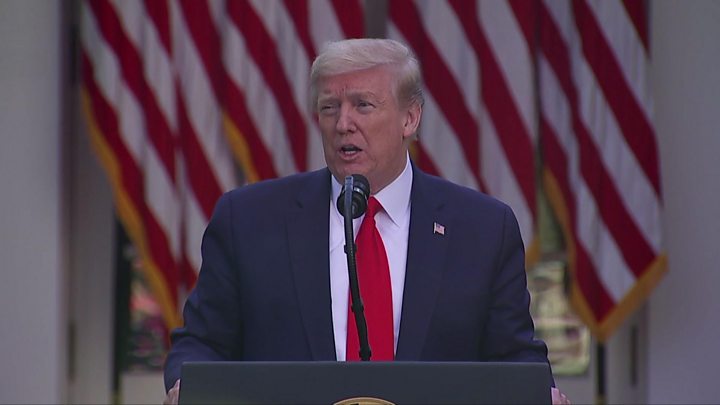A judge has blocked a US government attempt to ban the Chinese messaging and payments app, WeChat.
US Magistrate Judge Laurel Beeler said the ban raised serious questions related to the constitution's first amendment, guaranteeing free speech.
The Department of Commerce had announced a bar on WeChat appearing in US app stores from Sunday, effectively shutting it down.
The Trump administration has alleged it threatens national security.
It says it could pass user data to the Chinese government.
- Is the US about to split the internet?
- What TikTokers make of Trump's ban threat
Both WeChat and China have strongly denied the claim. Tencent, the conglomerate that owns WeChat, had previously described the US ban as "unfortunate".
The ruling comes just after TikTok, which was also named in the Department of Commerce order, reached a deal with US firms Oracle and Walmart to hopefully allow them to keep operating.
What happened in court?
The Justice Department asked for the order not to be blocked after a group of WeChat users filed a lawsuit challenging it.
The department argued it would "frustrate and displace the president's determination of how best to address threats to national security".
However Judge Beeler, sitting in San Francisco, noted that "while the general evidence about the threat to national security related to China (regarding technology and mobile technology) is considerable, the specific evidence about WeChat is modest".
Why does the US want the apps banned?
The US Department of Commerce Secretary Wilbur Ross said in a statement that the decision to block the app was taken "to combat China's malicious collection of American citizens' personal data".
The department said WeChat collected "vast swathes of data from users, including network activity, location data, and browsing and search histories".

Media playback is unsupported on your device
Friday's statement from the commerce department said the governing Chinese Communist Party "has demonstrated the means and motives to use these apps to threaten the national security, foreign policy, and the economy of the US".
Tencent, which owns WeChat, has said that messages on its app are private.
What is WeChat?
WeChat was set up in 2011. It is a multi-purpose app allowing users to send messages, make mobile payments and use local services. It has been described as an "app for everything" in China and has more than one billion monthly users.
Like all Chinese social media platforms, WeChat must censor content the government deems illegal. In March, a report said WeChat was censoring key words about the coronavirus outbreak from as early as 1 January.
But WeChat insists encryption means others cannot "snoop" on your messages, and that content such as text, audio and images are not stored on its servers - and are deleted once all intended recipients have read them.
tinyurlis.gdclck.ruulvis.netshrtco.de
مقالات مشابه
- سومر رای سنا در مورد حق رای را به تعویق انداخت زیرا نبرد با فیلیبوستی در پیش است
- ما خواستار اسرائیل برای قرار دادن ترمز در زیرساخت های مقابله با شرکت چینی به عنوان Pompeo می رسد در بیت المقدس برای مذاکرات – گزارش
- فروش خودرو کارکرده هیوندای با چند میلیون؟!
- ایاصوفیه: پاپ 'pained' به استانبول موزه تبدیل شدن به مسجد
- کره شمالی می گوید 'دو رگه سگ' جنوبی چرا آن را بمباران دفتر
- سناتورها در جلسه استماع انتخاب رگولاتور بانک بایدن به یکدیگر تیراندازی می کنند
- ترامپ از دیوان عالی میخواهد تا از دریافت فایلهای ضبط شده توسط کمیته شورش کنگره در 6 ژانویه جلوگیری کند
- کنیا 12 سال پیر با دختر بچه ازدواج کرده دو مرد در یک ماه
- روش جدید نشان می دهد که چگونه به بیماری پارکینسون پروتئین خسارت غشای سلولی
- بیماری های همه گیر و محیط زیست: چین COVID-19 مداخلات کاهش سطح دی اکسید نیتروژن